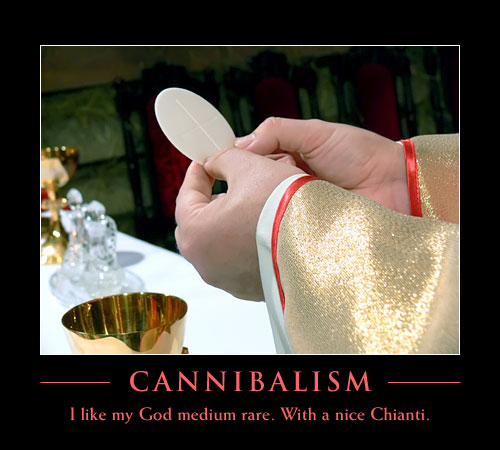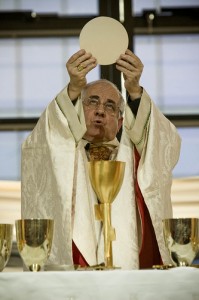
The Last Supper never happened
Saint Paul, the most prolific author in the New Testament, had almost nothing to say about Jesus the person. He had not read any of the Gospels, as they had not been written yet. There is, however, one notable exception, (although it may be an interpolation,) when in the first letter to the Corinthians, the author claimed he knew what Jesus said on the night he was betrayed.
 The writer had just finished lecturing women on what they should wear and what to do with their hair, when he turned to instructing the community on when to eat and drink. He used a story about Jesus at the Last Supper, and even claimed to quote the Lord, in an attempt to get the Corinthians to eat their meals together.
The writer had just finished lecturing women on what they should wear and what to do with their hair, when he turned to instructing the community on when to eat and drink. He used a story about Jesus at the Last Supper, and even claimed to quote the Lord, in an attempt to get the Corinthians to eat their meals together.
“For this is what I received from the Lord, and in turn passed on to you: that on the same night he was betrayed, the Lord Jesus took some bread, and thanked God for it and broke it, and he said, ‘This is my body, which is for you; do this as a memorial of me.’ In the same way he took the cup after supper, and said, ‘This cup is the new covenant in my blood. Whenever you drink it, do this as a memorial of me.’ Until the Lord comes, therefore, every time you eat this bread and drink this cup, you are proclaiming his death, and so anyone who eats the bread or drinks the cup of the Lord unworthily will be behaving unworthily toward the body and blood of the Lord. Everyone is to recollect himself before eating this bread and drinking this cup; because a person who eats and drinks without recognizing the Body is eating and drinking his own condemnation. In fact that is why many of you are weak and ill and some of you have died. If only we recollected ourselves, we should not be punished like that. But when the Lord does punish us like that, it is to correct us and stop us from being condemned with the world. So to sum up, my dear brothers, when you meet for the Meal, wait for one another” (1 Cor. 11:23–34, NJB.)
If Paul actually wrote this, he was trying to change some of the social habits of a community, perhaps to foster unity between different classes of people who finished work at different times. He invented a story about the Lord to do it. He made the ridiculous claim God punished people with death for not eating at the right time. This sort of deluded hyperbole was not unusual from the obsessive Paul. What is more surprising is that Paul acknowledged that a flesh-and-blood person, the Lord Jesus, ate, drank and talked with others; nowhere else do any of the genuine Pauline letters discuss what Jesus said or did, which is why I suspect this passage was an interpolation.
There are three other compelling reasons why this story is not historical.
– No sane person would predict his own impending death as part of a covenant with his god/dad. Jesus, who probably was crucified as a political insurgent by the Romans, would have had no intention of dying, and most definitely not as a sacrifice to save sinners. In those days some fanatics had bizarre religious ideas, but nothing as downright delusional as this.
 – Jesus was Jewish, as were his disciples, and they obeyed the Torah (the Jewish Law, as written in the first five books of Scripture.) To them, eating human flesh or drinking blood, even in a symbolic sense, would have broken the strict kosher dietary rules. Even today Jews still insist on draining blood from slaughtered animals, as written in scriptures, (Lev. 7:26–27, 17:10–14,) and will only eat the meat from animals that chew cud and have cloven hooves. (Lev. 11:3, Deut. 14:6.) Jesus, undoubtedly raised on a kosher diet, would have been repulsed by the thought of anyone drinking his blood or eating his body.
– Jesus was Jewish, as were his disciples, and they obeyed the Torah (the Jewish Law, as written in the first five books of Scripture.) To them, eating human flesh or drinking blood, even in a symbolic sense, would have broken the strict kosher dietary rules. Even today Jews still insist on draining blood from slaughtered animals, as written in scriptures, (Lev. 7:26–27, 17:10–14,) and will only eat the meat from animals that chew cud and have cloven hooves. (Lev. 11:3, Deut. 14:6.) Jesus, undoubtedly raised on a kosher diet, would have been repulsed by the thought of anyone drinking his blood or eating his body.
– This Last Supper scene was not something new. It was borrowed from Mithraism, a religion that had existed for two thousand years before Jesus, and with which Paul was familiar. Paul had probably grown up in Tarsus, a multicultural city which was a major centre of Mithraic belief. Mithraists believed that by eating a bull’s flesh and drinking its blood they would be born again. This was supposed to give physical strength, and bring salvation to the soul (http://www.farvardyn.com/mithras4.php).
Jesus the Jew would not have copied these concepts from a competing cult. Paul, or one of his interpolators, made this up to mimic a popular pagan practice.
The synoptic Gospels, written much later, have similar verses, and their inspiration was probably Paul’s letter.
 The reenactment of this scenario is part of some modern Masses in which bread and wine become the body and blood of Christ, yet it has no truthful basis.
The reenactment of this scenario is part of some modern Masses in which bread and wine become the body and blood of Christ, yet it has no truthful basis.
Christianity quite deliberately blended guilt, dependence and ceremony to create church-centred dogma. The ritual that Paul discusses here brings people together to do something. Communion commemorates the sacrifice of a man dying because you’re a sinner. By participating in the event, people are repeatedly reminded they are flawed and need Christ and the Church to be redeemed. That promotes power, and priests know it. (http://www.youtube.com/watch?v=GTTwSJK_XMI).



